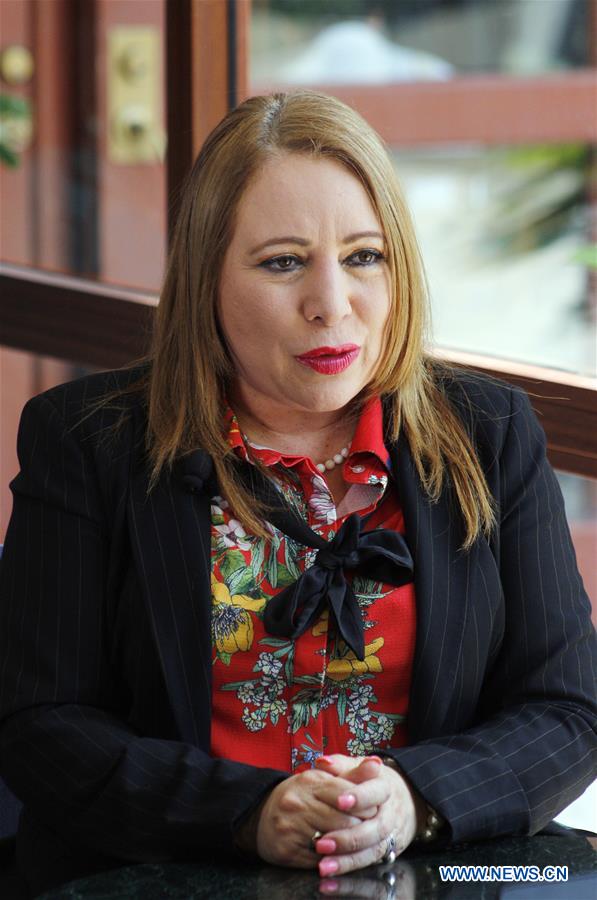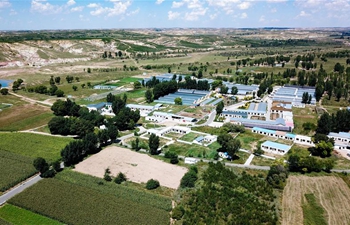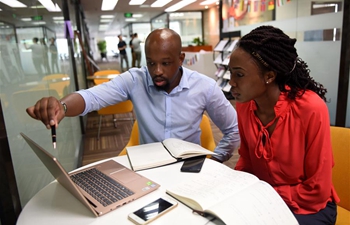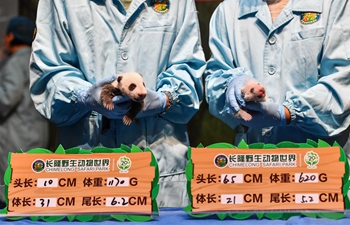 ?
?
El Salvador's Economy Minister Luz Estrella Rodriguez speaks during an interview in San Salvador, capital of El Salvador, on Aug. 22, 2018. El Salvador's newly-established diplomatic ties with China are fueling expectations of trade and economic growth, the central American country's Economy Minister Luz Estrella Rodriguez said. (Xinhua/Alexander Pena)
SAN SALVADOR, Aug. 23 (Xinhua) -- El Salvador's newly-established diplomatic ties with China are fueling expectations of trade and economic growth, the central American country's Economy Minister Luz Estrella Rodriguez said.
President Salvador Sanchez Ceren's decision to establish ties with China earlier this week has been met with wide satisfaction, Rodriguez told Xinhua, adding that she believes the move was vital to boosting bilateral commerce.
"Without a doubt, trade ties are going to be strengthened and there will be more opportunities for trade and investment flows between the two countries," said Rodriguez.
"In economic matters, everything from programs to projects, technical exchanges and experience-sharing will be strengthened," she said.
China and El Salvador signed a joint communique in Beijing Tuesday on the establishment of diplomatic relations.
As part of the communique, El Salvador "recognizes that there is but one China in the world," as 177 other countries do, and that "Taiwan is an inalienable part of China's territory."
"By acknowledging that there is only one China, we are united by more factors of friendship and of mutual recognition of each country's sovereignty," Rodriguez said.
The minister said she has closely followed the progress of China's Belt and Road Initiative, in which her country is keen to participate.
The Pacific-facing Central American nation is "part of a developing area that could offer enormous strategic opportunities for trade from all countries coming together around the opportunity that is Belt and Road. So El Salvador would definitely appreciate being able to form part of this very important Chinese initiative," Rodriguez said.
The country currently exports some 50 million U.S. dollars worth of goods to China, mainly sugar, but hopes to diversify.
"We've reviewed it and we have 20 to 30 strategic products in which we are complementary. El Salvador can be a natural supplier of foodstuff, beverages and raw materials," said the minister.
To that end, El Salvador is very interested in taking part in the first ever China International Import Expo (CIIE) to be held in November in Shanghai.
"We are definitely looking for a spot to have a presence at the November fair in Shanghai. We are also inviting China for the first time to officially be a part of our international fair each November," she said.
El Salvador has at least four laws to promote foreign investment through lower tariffs and other benefits that could be of interest to Chinese businesses, Rodriguez said.
"Still, we have been talking about the possibility of a fifth law that could offer special privileges and be an interesting leverage for investments in the area to strengthen Pacific-to-Pacific trade -- an alternative entry route into Central America for China via our Central American Union port," she said.
El Salvador, along with neighboring Nicaragua and Honduras, forms part of the the Customs Union of Central America's North Triangle, which has promoted cross-border trade by slashing the time it takes to move goods through customs.
With ties established, El Salvador should now study the possibility of pursuing a future bilateral free trade agreement with China, she said.
In the meantime, Rodriguez hopes to see ties boost tourism from China.
"We have all kinds of routes, we have the ocean, mountains, volcanoes, a wide range of things to do ... China can consider El Salvador as a tourist destination," Rodriguez said.











